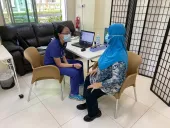
A different take on health care innovation
How CapsuleTech is reinventing our idea of medical solutions
When on the subject of the medical technology industry, what often comes to mind is the idea of ‘invention’. Most people who wish to enter and thrive in the industry are always looking to invent the “machine of the future” – the next CT scan, the next X-ray, and so on. While it’s all about plain creation for most, CapsuleTech shows that innovation comes in different forms; that building on current technology is just as innovative and useful as creating a completely new invention.
Building on history
Founded in France in 1997, CapsuleTech began as a small consulting company. As it navigated its way through the clinical IT market, the company discovered a niche that it could fill. CEO Gene Cattarina recalls the hospital information system of the past and describes the complications that it suffered. “Many of the bedside medical devices had different protocols, many standards. It was a real problem for hospitals to take this data and move it into their medical records,” he says.
Almost two decades ago, there was very little competition for CapusleTech’s idea. When a major need for the innovation surfaced in 2004, the company received its first round of venture capital funding. Shortly thereafter, CapsuleTech started a division in the United States.
CapsuleTech’s core business is providing medical device information systems, which are designed to capture and manage data from a hospital’s various medical devices for timely delivery to electronic medical records, as well as clinical systems for analysis and decision support. The company is present in the US, as well as in Singapore, at over 1,700 hospitals in 37 countries, and is looking to expand further to the rest of Southeast Asia. CapsuleTech’s big idea was actually borne out of the clutter left behind by past ‘new ideas’. “There was a very important niche that needed to be filled in clinical IT and healthcare,” shares Cattarina, “that niche was to be able to get medical information from medical devices into the electronic medical record.” CapsuleTech was able to see that the plethora of unintegrated medical devices was making it difficult for hospitals to efficiently synthesise medical data for effective analysis.
By simply focusing on the data communication shortfalls of the then-current medical devices instead of focusing on building something completely new, CapsuleTech was able to provide a solution to the medical field’s multiple medical device data integration problems which were often shrugged off. Problems such as the risk of human error, the risk of untimely responses, and plain inefficiency of what was then a primarily manual data entry process, were addressed by a simple yet game-changing innovation.
From the very beginning, location has been a key element for CapsuleTech in terms of business expansion and growth. “The growth opportunity today is to look at things globally,” Cattarina adds. This is one of the reasons why CapsuleTech is in Asia, particularly in Singapore. The company is currently looking at four very important markets: the US, Northern Europe, Southeast Asia, and Middle East. For CapsuleTech, Southeast Asia’s remarkable growth is the key factor driving the Company’s initiatives in the region. CapsuleTech already has one major tender in Singapore along with four major tenders going on in Australia.
“Singapore is the gateway to Southeast Asia. The sophistication of healthcare IT in Singapore is rather good compared to other countries, and that makes what we do important.”
Scaling up solutions
CapsuleTech is also proactively taking steps to widen the reach of their solutions. For instance, CapsuleTech’s Medical Devices Information System could change the way doctors respond to critical cases. “We can take the data and send it to the hospital’s clinical decision support and alarm management systems, which can alert doctors to a patient’s deteriorating condition,” shares Cattarina. This is especially important for cases such as Sepsis, when the prospect for recovery virtually decreases by the hour.
CapsuleTech is also developing dashboards to monitor biomedical devices. “We will know exactly what’s going on, which medical devices are being used, when they’re being used, and what room they’re being used in.”The company aims to extend its reach to other areas such as ambulatory, longterm care and skilled nursing facilities. CapsuleTech’s systems will not only allow hospitals to be more efficient in their operations, but the information collected through CapsuleTech’s systems could also help make Big Data more intelligible. Ultimately, CapsuleTech’s goal is to improve the quality of clinical outcomes, decrease the chances for medical errors, and improve the productivity of clinicians in their day-to-day work environment.













 Advertise
Advertise













